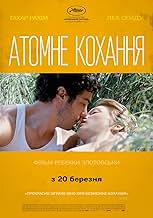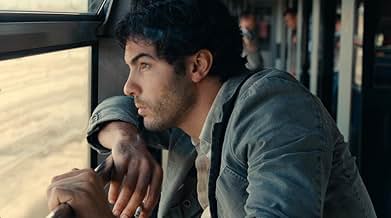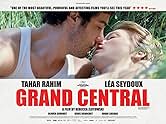Gary is young, agile, a quick learner. He's one of those who's never been promised anything. After a succession of odd jobs, he's taken on at a nuclear power plant. There, amongst the reacto... Read allGary is young, agile, a quick learner. He's one of those who's never been promised anything. After a succession of odd jobs, he's taken on at a nuclear power plant. There, amongst the reactors, he finally finds what he's been looking for.Gary is young, agile, a quick learner. He's one of those who's never been promised anything. After a succession of odd jobs, he's taken on at a nuclear power plant. There, amongst the reactors, he finally finds what he's been looking for.
- Awards
- 5 wins & 9 nominations
Storyline
Did you know
- ConnectionsFeatured in Women Make Film: A New Road Movie Through Cinema (2018)
- SoundtracksGhost Tracks
Written by Jeremy Jay
Performed by Jeremy Jay
Courtesy of Domino Publishing
Featured review
"Grand Central" is about people so poor, so hard-up, that when they have their wallets pinched from them aboard trains, the thieves look on in anguish at the fact said wallets are completely devoid of all currency. There is not a sausage – not even a few coins. It is also about men – men who don't have very much, but get by; who are not educated, but do an important job; who are loath to give away what precious few things they already have. Lastly, the film is somewhat of a romance and is a study of the lengths people go for those whom they love.
There is a quite brilliant character drama swimming around in "Grand Central" somewhere, where each and every perfectly timed revelation induces its own tragic result and nuanced spark, but I could not find it. Once you have recalled Ken Loach's 2001 film "The Navigators", which, like "Grand Central", is about working class men just about getting by in their demanding jobs on top of whatever else life throws at them outside of the workplace, it is very difficult to remove it again and "Grand Central" film suffers as a result of this.
The film's lead is Gary (Tahar Rahim), a young Frenchman from Lyon who flits from job to job with very few qualifications but a lot of energy and heaps of enthusiasm to work. He likes bars; beer and pool, and fits into blue-collar society very easily. He has never been in love; struggles for money and maintains a very fragile relationship with his extended family of in-laws and blood relations.
Life has been fairly anonymous for Gary until this latest escapade lands him a work placement at a nuclear power plant in a rural stretch on the fringes of a small town. With one thing leading to another and the elements conspiring against him, he settles down in a small gypsy camp with a family of people – one of whom, Toni (Denis Menochet), he knows through work at said plant : he is Gary's supervisor. Toni's wife is the promiscuous Karol (Léa Seydoux), who is around Gary's age and whose presence eventually complicates things.
Writer/Director Rebecca Zlotowski seems to take her raw cue from John Steinbeck's novel "Of Mice and Men". This is most certainly a text about people at the lower end of a capitalist society just about getting by with tough, honest work under burdensome conditions having ambled around the country and suddenly stumbled into employment. The intimacy of the living quarters are quite striking: Californian bunks are swapped for old caravans that do not feel as if they have moved in decades.
It is to Zlotowski's credit that she captures the world of where this film takes place remarkably well: the power station acts as this huge, God-like presence which looms in the background and dominates the skyline. Its warning alarms, sounded weekly for purposes of testing, echo around the hills; fields and riversides, reminding us all of its presence and of its inescapable nature. Its interior is shot intimately and intensely – a space where macho, uncouth blue-collar guys must radically change gears and drop their exterior personas in order to survive in their becoming very calm; intricate and careful in the doing of their job.
Rebecca Zlotowski strikes me, from what I saw in "Grand Central", as somebody able to make a film without necessarily being able to tell a story or really bring characters to life off a written page. She has, without question, an eye for imagery and atmosphere – when the film takes you into the plant for the first time, there is an incredible sense of claustrophobia and danger. You sense real harm could leap at you from nowhere and there is a real fear for the characters' safety.
Otherwise, the film is peppered with individual moments of what are otherwise moments of silence or contemplation which are quite striking: the manner about which the camera loiters in the train carriage during the opening scene, affording the lead a glimpse at the looming nuclear station as he heads into town; the way Gary, with friends we sense he has never had, hares down an isolated county road in a convertible sports car on a day off with two others – techno music blaring out of the stereo.
What is lacking is the material that makes up the film's narrative, which is essentially straight out of a daytime television serial. The relationship at the core of the film, that of Gary's with Karole, and how that might put strain on an existing friendship Gary already has, is derivative and does not move us. We have seen this plot before in something else. We have accidentally read about how it will rock the town; village or suburb of our nations' favourite soap opera within the next few weeks inside cheap television magazines or guides.
While "Grand Central" unquestionably suffers from these things, on top of the fact its characters are, when scrutinised, remarkably one-dimensional, it just about manages to stand up on the strength of its imagery and how its director manages to capture the world around whom it is depicting. Its central theme, that love knows no bounds and tremendous lengths are often gone for those close to another, even if that means death by radiation, is worthy.
There is a quite brilliant character drama swimming around in "Grand Central" somewhere, where each and every perfectly timed revelation induces its own tragic result and nuanced spark, but I could not find it. Once you have recalled Ken Loach's 2001 film "The Navigators", which, like "Grand Central", is about working class men just about getting by in their demanding jobs on top of whatever else life throws at them outside of the workplace, it is very difficult to remove it again and "Grand Central" film suffers as a result of this.
The film's lead is Gary (Tahar Rahim), a young Frenchman from Lyon who flits from job to job with very few qualifications but a lot of energy and heaps of enthusiasm to work. He likes bars; beer and pool, and fits into blue-collar society very easily. He has never been in love; struggles for money and maintains a very fragile relationship with his extended family of in-laws and blood relations.
Life has been fairly anonymous for Gary until this latest escapade lands him a work placement at a nuclear power plant in a rural stretch on the fringes of a small town. With one thing leading to another and the elements conspiring against him, he settles down in a small gypsy camp with a family of people – one of whom, Toni (Denis Menochet), he knows through work at said plant : he is Gary's supervisor. Toni's wife is the promiscuous Karol (Léa Seydoux), who is around Gary's age and whose presence eventually complicates things.
Writer/Director Rebecca Zlotowski seems to take her raw cue from John Steinbeck's novel "Of Mice and Men". This is most certainly a text about people at the lower end of a capitalist society just about getting by with tough, honest work under burdensome conditions having ambled around the country and suddenly stumbled into employment. The intimacy of the living quarters are quite striking: Californian bunks are swapped for old caravans that do not feel as if they have moved in decades.
It is to Zlotowski's credit that she captures the world of where this film takes place remarkably well: the power station acts as this huge, God-like presence which looms in the background and dominates the skyline. Its warning alarms, sounded weekly for purposes of testing, echo around the hills; fields and riversides, reminding us all of its presence and of its inescapable nature. Its interior is shot intimately and intensely – a space where macho, uncouth blue-collar guys must radically change gears and drop their exterior personas in order to survive in their becoming very calm; intricate and careful in the doing of their job.
Rebecca Zlotowski strikes me, from what I saw in "Grand Central", as somebody able to make a film without necessarily being able to tell a story or really bring characters to life off a written page. She has, without question, an eye for imagery and atmosphere – when the film takes you into the plant for the first time, there is an incredible sense of claustrophobia and danger. You sense real harm could leap at you from nowhere and there is a real fear for the characters' safety.
Otherwise, the film is peppered with individual moments of what are otherwise moments of silence or contemplation which are quite striking: the manner about which the camera loiters in the train carriage during the opening scene, affording the lead a glimpse at the looming nuclear station as he heads into town; the way Gary, with friends we sense he has never had, hares down an isolated county road in a convertible sports car on a day off with two others – techno music blaring out of the stereo.
What is lacking is the material that makes up the film's narrative, which is essentially straight out of a daytime television serial. The relationship at the core of the film, that of Gary's with Karole, and how that might put strain on an existing friendship Gary already has, is derivative and does not move us. We have seen this plot before in something else. We have accidentally read about how it will rock the town; village or suburb of our nations' favourite soap opera within the next few weeks inside cheap television magazines or guides.
While "Grand Central" unquestionably suffers from these things, on top of the fact its characters are, when scrutinised, remarkably one-dimensional, it just about manages to stand up on the strength of its imagery and how its director manages to capture the world around whom it is depicting. Its central theme, that love knows no bounds and tremendous lengths are often gone for those close to another, even if that means death by radiation, is worthy.
- johnnyboyz
- Dec 8, 2017
- Permalink
- How long is Grand Central?Powered by Alexa
Details
- Release date
- Countries of origin
- Official sites
- Language
- Also known as
- Гранд Централ. Атомне кохання
- Filming locations
- Cruas, Ardèche, France(exteriors: nuclear plant)
- Production companies
- See more company credits at IMDbPro
Box office
- Gross worldwide
- $1,713,691
- Runtime1 hour 34 minutes
- Color
- Sound mix
- Aspect ratio
- 1.85 : 1
Contribute to this page
Suggest an edit or add missing content



























